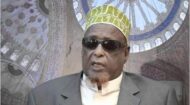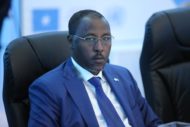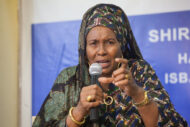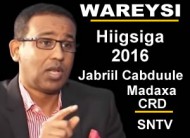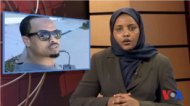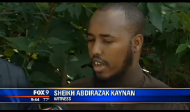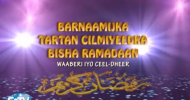

Let’s embrace our fellow Africans because we can learn a thing or two from them, writes Victor Kgomoeswana.
Johannesburg – Do you know what supermodel Iman Abdulmajid, musician K’naan, who gave us the World Cup 2010 theme song, Waving Flag, author, writer and activist Ayaan Hirsi Ali and Olympic double-gold medallist runner Mo Farah have in common?
They are all natives of Somalia who have carved out a name for themselves in other parts of the world: Iman in the US, K’naan in Canada and Ayaan Hirsi Ali in the Netherlands, where she became a member of parliament.
I pondered this fact when I read the 2015 Index of Economic Freedom by the Heritage Foundation.
The report had no data on Somalia. For once, I appreciated the yawning gap between Somalia and South Africa. I realised that, had I been born a Somali, I would have found my way to South Africa. This is where my glance of this week in Africa begins.
I am in no position to argue against the economic hardships of those involved in the looting.
But I know that those involved would certainly have no time for looting if they had a viable business or job to take care of.
I am also not going to contest the importance of balancing the interests of local spaza shop owners and those of the foreign nationals.
It is senseless to dispute allegations that some foreign nationals use anti-competitive methods to undercut their local counterparts without facts.
It is the lost opportunity to cash in on the enterprise of the foreign nationals that pains me.
What if we had an Iman, K’naan, Ali and a Farah in South Africa?
K’naan has a musical career far away from home in Canada.
Ali, escaping an arranged marriage, sought refuge in the Netherlands and is now a serving member of parliament and co-producer of a documentary, Submission. The aftermath of this video production includes the killing of her co-producer, Theo van Gogh.
Olympic athlete Farah could hardly speak English when he moved to the UK in 1991. He was awarded the Commander of the Order of the British Empire for his contribution to British athletics. Many believed he deserved a full knighthood.
Farah won both the 5 000 metres and 10 000m for Britain in the 2012 London Olympics.
Somalis seem to shine everywhere in the world, controversially or otherwise.
The challenge of living with no government between 1991 and 2013, plus the ongoing terror of al-Shabaab and other dangers should shed light on the insurmountable challenges Somalians face.
The country is only now beginning to recover from the prolonged spell as a failed state.
Even the Index of Economic Freedom has no data on the country to show how the lack of institutions makes it impossible to operate.
My theory is that staying alive in Somalia certainly takes some entrepreneurial grit.
Making it from there to South Africa, legally or illegally, then setting up a profitable shop in a community whose language you do not speak is nothing short of a miracle.
Is there no workable balance between what some have called a foreign takeover of the township businesses and a hostile rejection of fellow Africans?
If the Dutch could embrace Ali, Canada welcome K’naan, why can’t South Africans make the most of the Somali enterprising spirit now in our midst?
Enterprise or entrepreneurial spirit, which is the key ingredient of a winning nation, travels further than entitlement.
Henry Kissinger became secretary of state in a country where he had been a refugee.
Bodybuilder Arnold Schwarzenegger made it as a Hollywood star in the US, then became the 38th governor of California. Who cares if he is Austrian-born, he is an American now.
It is no use worrying about how the Somalis got to South Africa, or whether their businesses are unfairly undercutting their South African counterparts in the townships.
They are here, they are enterprising and they want to stay here.
Let us find a way to accept and turn them into legitimate contributors to the South African economy.
They could teach us a thing or two about supporting our own enterprises, building bargaining power for supply-chain efficiencies and work ethics.
After all, the ultimate arbiters, the customers, are voting with their wallets.
Toast of the week – the people of Zambia! The Patriotric Front presidential candidate, 58-year-old Edgar Lungu, won a close contest to become president of Zambia.
He beat rival Hakainde Hichilema of the United Party for National Development by 48.33 percent to 46.67 percent in the poll.
The January 20 elections proved yet again that the people of Zambia can take care of democracy.
Why am I toasting a political process? Zambia is a critical member of the Southern African Development Community (SADC) and a major copper producer.
The mining economy has raised millions of dollars in bonds to finance infrastructure to link it to the other economies in the southern and central parts of Africa, including the Democratic Republic of Congo, Tanzania, Mozambique and Zimbabwe.
Stability in Zambia is key for the SADC region and the entire Africa.
A failure to hold peaceful democratic elections would have been bad for the growth of an emerging economy like Zambia and the region. And what is even more commendable is that the elections were rushed because of the death of the incumbent head of state, Michael Sata.
The ability and poise to organise elections earlier than scheduled without any major incident rewards the faith of investors in the economy. Kudos to the Zambians!
The Ebola scourge can be beaten! A glimmer of hope from the West.
I read with glee reports that Sierra Leone, Liberia and Guinea-Conakry have started to contain the spread of the killer disease.
The establishment of a UN nerve centre in Ghana in October last year received a mixed reception.
At the time, the virus was winning the battle but this week two stories were enough to restore my faith in the ability of multilateral efforts to contain the spread.
Liberia reported it only had five cases of Ebola and the largest treatment centre in the world was being dismantled as life seemed to be returning to normal.
Weddings are again in vogue and the only question is what the risk of resurgence is.
It is a matter of time before the two other affected countries get in sync with Liberia and the region is restored to its former vibrant economic self.
Another encouraging report this week was about the progress made on the pharmaceutical front. After efforts to develop effective drugs to counter Ebola, including ZMapp from the San Diego-based Mapp Biopharmaceutical and the TKM-Ebola injection developed by Tekmira Pharmaceuticals of Canada, there seems to be hope.
GlaxoSmithKline reported the results from the first human trial of its Ebola vaccine showed it was safe and elicited an immune response.
Although larger trials are pending, the vaccine is already being delivered in Liberia.
It was said to be effective against the Zaire strain of Ebola, the cause of panic around West Africa.
Pharmaceutical products are never perfect, but considering how Ebola had the world petrified any breakthrough is welcome.
This demonstrates how problems facing Africa can be addressed with African leadership and international support.
At least, in time, all Africans will be able to travel without being equated with Ebola, irrespective of where we come from.
Most of all, the economy of the region will start to recover.
Speaking of economic recovery in West Africa, Ghana is one country that has been stumbling its way to the International Monetary Fund to address its crisis created by a weaker currency.
Deputy Finance Minister Mona Quartey told a conference in Accra that the economy was now forecast to grow 4.2 percent instead of an expected 7.1 percent.
Alarm bells in West Africa’s rising star? No, thinks the feisty deputy finance minister as she argues the economy is still resilient.
One of the reasons could be that Ghana continues to ink major foreign investment deals in sectors of the economy that matter.
One that stood out this week was a $7 billion (about R81 billion) agreement with energy firms ENI and VITOL for the development of oil and gas.
President John Mahama said the project would add 1 100MW to the grid and deliver up to 170 million cubic feet of gas daily for 20 years. And the inception date? 2017. Stumbling, yes. Stalling, never!
Look out, however, as piracy is on the rise on the West African seas. It used to be a scourge on the Somali coast, remember?
The International Maritime Bureau of the International Chamber of Commerce recorded 41 piracy cases involving 442 crew members held hostage last year.
This number was 304 in 2013. Growing pains of Africa! As with the Somali piracy, this will take international action to contain.
Snippets from East Africa: Kenya could be roaring ahead even more after its planned biometric registration for money transfers to the elderly takes off in March this year.
The country, which led the way with M-Pesa, is likely to make access to financial services even more world-class with this move.
Add to that the 1.5 percent additional growth of the country’s GDP due to the roll-out of the standard-gauge railway and you get the picture of where Kenya is headed.
The AU Summit is being held in Addis Ababa in Ethiopia.
President Salva Kiir of South Sudan caused a stir during proceedings at the summit this week amid talks to resolve the impasse in his country. The South Sudanese leader was reportedly rushed to hospitals with nosebleeds.
South Sudan cannot afford a medical layoff for someone as key as Kiir, so let’s hope the leader of the oil powerhouse of East Africa will be back on his feet soon.
A hero who set the gold standard for all of us
A snippet from home: “Tsietsi” Teboho Macdonald Mashinini was posthumously awarded for his courage in leading the milestone student uprising of June 16, 1976. The June 1976 hero, who was born on January 27, 1957, was a charismatic leader.
He attended the Morris Isaacson High School, where his history and English teacher was Abram Onkgopotse Tiro.
The teacher taught at the school after he was expelled from the University of the North (now the University of Limpopo) for his political activities.
Facing the wrath of apartheid security forces after the June 1976 uprising, Tsietsi fled South Africa via Botswana. He ended up in West Africa, where he died in Guinea-Conakry in 1990.
In 2011, he was posthumously awarded the Order of Luthuli in Gold for his inspiration as young leader and for the sacrifices he made by leading the student protest in Soweto against Afrikaans as a medium of instruction, and for his role in the struggle against apartheid.
* Kgomoeswana is author of Africa is Open for Business, anchor of CNBC Africa’s weekly show Africa Business News and anchor of the daily show Power Hour on PowerFM. He writes in his personal capacity.
** the views expressed here are not necesssarily those of Independent Media.
The Sunday Independent

 All Posts
All Posts

